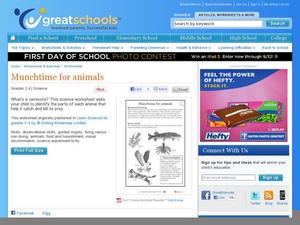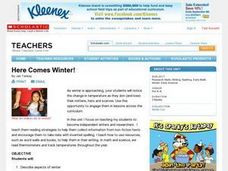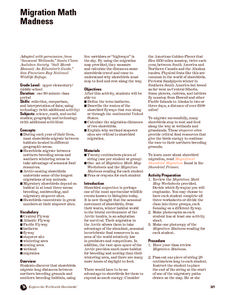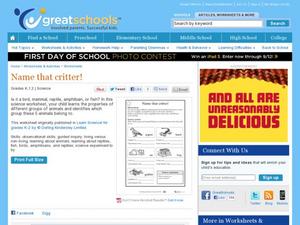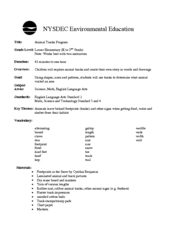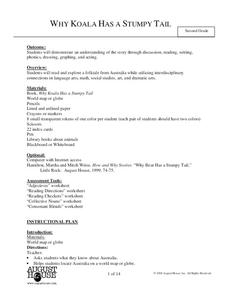Curated OER
Winter-time Temps
Students measure temperature and become aware the the temperature above and below the snow is different. In this winter temperature lesson, students measure temperatures to find variation based on how the snow is packed. Students create...
Curated OER
Plants and Animals: Alike and Not Alike
After reading an informative paragraph that outlines some of the differences between plants and animals, fifth graders attempt to correctly categorize 12 words in a word bank. They must put them in the plant, or animal category. This...
Curated OER
Munchtime for animals
Which animals eat meat to stay alive? Third graders group fish, hawks, and cats into carnivores and herbivores. An extended activity prompts kids to cut out magazine pictures of different animals according to the foods that they eat.
Curated OER
Here Comes Winter!
Students investigate winter behaviors in animals. They describe winter and write about the characteristics of the season by drawing and labeling a winter picture. Students then conduct research on a chosen animal and create a chart. ...
Curated OER
Track Traces
Students explore animal characteristics by participating in an animal anatomy activity. In this animal tracks lesson, students identify the differences between specific animals and the shape of their footprints. Students utilize a...
Prince William Network
Migration Math Madness
A great way to incorporate math into life science, this lesson has learners measure migratory routes on a map and calculate the actual distance that shorebirds on the routes would cover. Learners compute the distance covered in both...
Curated OER
Name That Critter
Young learners classify five different animals into their proper category. The animals pictured are a pigeon, a lizard, a cat, a frog, and a goldfish. Pupils are also asked to tell why they know it's a certain kind of animal. An...
National Park Service
Nutcracker Fantasy
The Clark's nutcracker bird hides seeds in 25,000 different sites every year to save for winter. Lesson demonstrates how difficult it would be to find these seeds months later when they need them for food. In the first of five lesson,...
Curated OER
Animals Finding Rice Paddies
Fourth graders examine the animals who live in rice paddies and create a chart. In this rice instructional activity, 4th graders link the types of animals living in each ecosystem with a bar graph. Students use colored bars to show...
Curated OER
The Hat
Honing reading and communication skills through the theme of farm animals is the focus of this lesson. Students read a book about Scandinavian farm animals and complete prediction journal activities. They complete a worksheet about the...
Curated OER
Winter Animal Match
Students play a game. In this matching lesson, students learn about animals and their winter homes. Students match cards of animals with the cards of winter homes.
Curated OER
How Animals Prepare for the Winter
Students study animals. For this hibernation lesson, students are read Stranger in the Woods and they discuss what various animals do in their habitat during the winter. They work as a class to create their own hibernation environment...
Curated OER
Food chains at sea
Fifth graders interpret a table of data about food chains in the ocean. They create a food chain to represent the information on the table. Periwinkles eat seaweed, and crabs eat periwinkles - so who eats crabs? Extend the activity with...
Curated OER
Animal Tracks Program
Entice your learners with this lesson on animal footprints. After reading the story Footprints in the Snow by Cynthia Benjamin, they use photos to identify animals and their footprints. Then they participate in an activity to classify...
Curated OER
Life in the Arctic
Middle schoolers create a model of an arctic animal. In this animal adaptation lesson, students research an arctic animal, create a 3-D model of their animal, and explain the physical characteristics animals in the arctic need to survive.
Curated OER
Get Ready, Get Set, Hibernate
Students match each body part or idea from a work bank about methods of animal adaptations for winter survival. They observe as the first one, food is covered with the whole class before completing the rest of the diagram. They discuss...
Curated OER
Getting nosy
A nose knows! Connect animals to their noses with a fun science activity. Animals include elephants, rats, pigs, and even humans. For a science exploration, kindergartners answer questions about what they can smell. A great addition to...
Prince William Network
Migration Headache
During this game, kids become migratory shorebirds and fly among wintering, nesting, and stopover habitats. If they do not arrive at a suitable habitat on time, they do not survive. Catastrophic events are periodically introduced that...
Curated OER
Do the Locomotion with Me
Fourth graders listen to a reading of In the Snow Who's Been Here? They experiment with making tracks by painting the bottom of their shoes and making tracks using different forms of locomotion. They apply what they know to winter...
Prince William Network
The Incredible Journey
Divide your school gym into breeding grounds and non-breeding grounds so that your zoologists can play a game simulating the seasonal migration of shorebirds. Players pick one of the included game cards and follow its directions, which...
Curated OER
Hibernating Hoopla
Young scholars simulate hibernation with their stuffed animals. They predict the length of time of hibernation and type their math journal entries about sorting, graphing and draw pictures. They read bear hibernation stories.
Curated OER
Animal Adaptations
Animal adaptations, such as camouflage, are high-interest topics that are easily integrated into both reading and math curriculum.
Curated OER
Why Koala Has a Stumpy Tail
Second graders explore Australian folktales. In this folktales lesson, 2nd graders gain knowledge about Australia and it's animals by reading books and discussion. Students find the adjectives in the book and write what they describe....
Curated OER
Taiga
For this taiga worksheet, students read a short article describing what a taiga is and then answer 10 multiple choice, true or false or short answer questions relating to the article.




